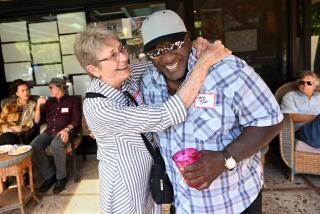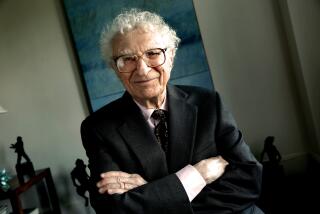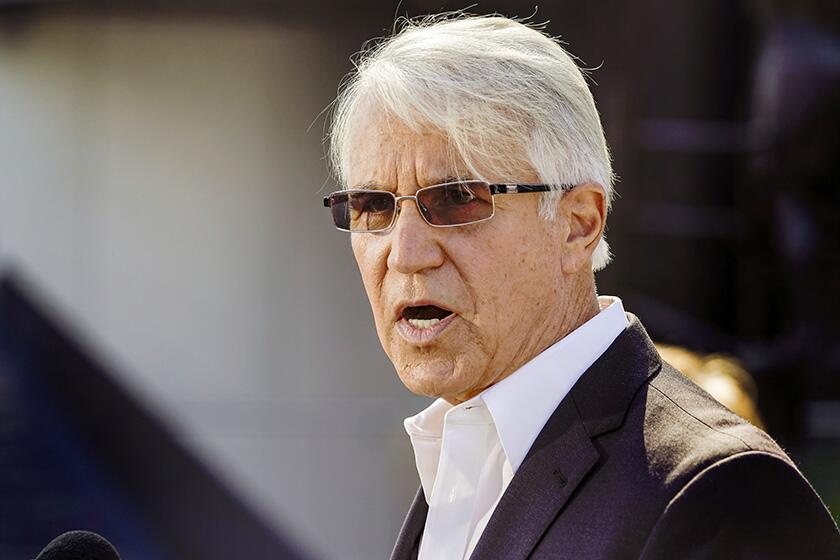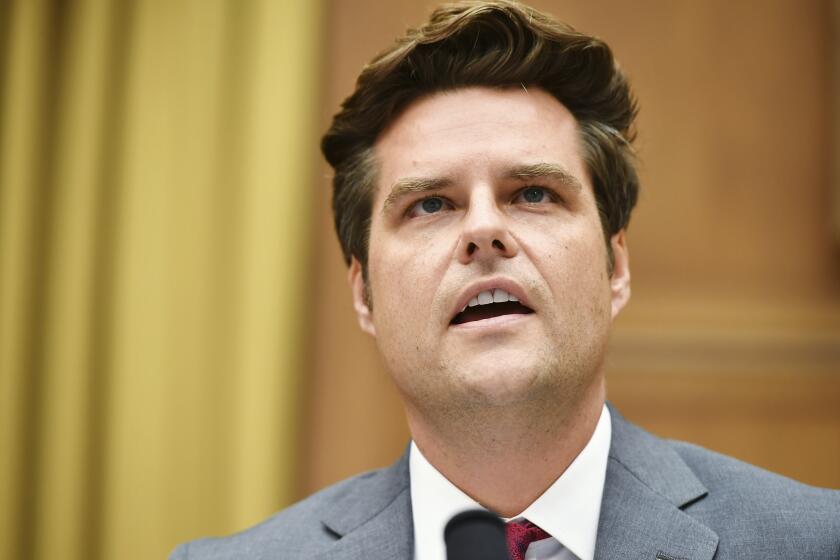Op-Ed: My grandfather was mainly a figure in a Broadway play to me — until I read his journals
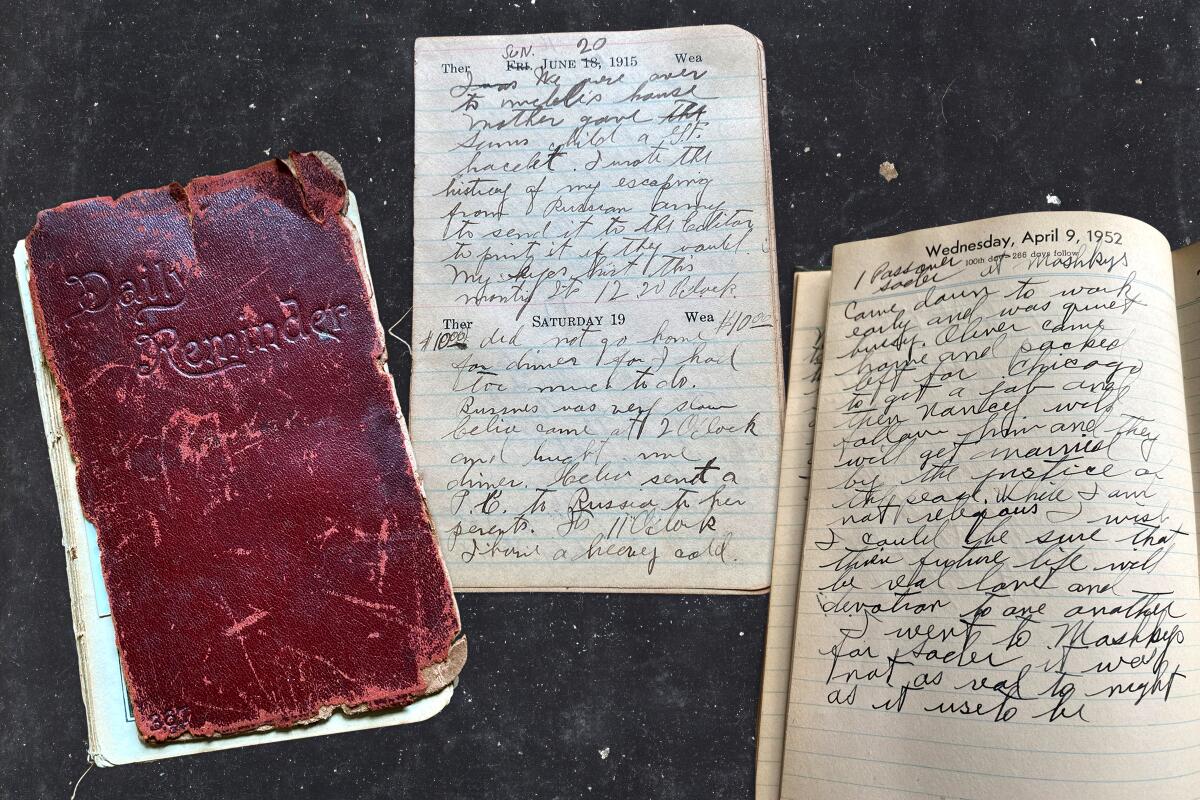
On May 28, 1952, “Sunday Breakfast,” a play about a workaholic small-town jeweler who torments his family, opened at the Coronet Theatre on Broadway. Stella Adler directed. Cloris Leachman played the loose daughter. Neither would consider the play a career highlight. An exasperated New York Daily News critic wrote about the father character, George Decker: “Whenever he has nothing else to do — which is seldom — he polishes silver.” The play closed little more than a week later.
My family members may be the last people alive who still talk about “Sunday Breakfast,” a play co-written by my dad’s cousin Miriam Balf and based on my grandfather Theodore “Teddy” Balf, a workaholic small-town jeweler in Rye, N.Y.
Teddy came to the U.S. from Kovel, Russia, passing through Ellis Island on New Year’s Day 1909. He went to work for an Astoria watchmaker and a few years later married Celia Ainbinder, a recent emigre he had known in the old country. The year they were married, 1915, he began keeping a journal. He would follow up with 41 other yearly journals, writing every day for the rest of his life.
His niece mined them for identifying details that were spread throughout the play — their Purchase, N.Y., address, a glass wind chime he patented, a family trip to Maine. The play was fiction, but it was not.
Teddy died a few years before I was born, but he looked stern in portraits my artist dad did as a young man: narrow face, sharp nose, thin upkept hair. For a half-century, my grandfather was mainly just a figure in a play to me.
In a pandemic lull, I decided to read the journals, start to finish. It seems nobody in my family had. I was probably looking for a bit of gossip. Instead, I started photographing individual pages — and ultimately took 200 pictures, for what, I wasn’t sure. But I began to connect with him, find joys in his quirks and a voice where I expected none.
Teddy loved to walk. My mother, now 91, remembered him inviting her and my dad to a dinner and them walking the five miles between Rye and a Port Chester, N.Y., restaurant. In one entry he described a perfect day in a forest near a local hamlet. He walked and walked, eventually stopping at a secluded grove to read, write letters, nap, catch frogs and play the fife. He was 62.
Some of the journals were extra-stuffed with revealing personal letters or starred with bright blue WWI war bond pins. The penultimate journal contained a neatly folded obit on Albert Einstein. A four-leaf clover was taped to the title page of the 1950 book.
Most people keep their diaries hidden. They put them under pillows and in drawers.
I began to look up distances between small Westchester County towns and tried to learn the back story to the restaurants, butcheries, and the old Embassy and Capitol picture houses he frequented. A picture began coalescing like descending braids of river water. A narrative improbably gained steam.
The early journals were in English, but when any of the good stuff happens, he reliably lapsed into Yiddish. They tell the story of an immigrant couple struggling for a foothold. The latter years, from 1947 to 1956, were about life on his own, grieving for his wife who died at 49, and drawing unexpectedly close to his two sons.
I found all of it surprising, especially the last part. In 1946 Teddy and my dad, then 19, went on overnight trips, long walks, made records on the “recording machine” my grandfather apparently dragged to every wedding and party. He was complicated, but he wasn’t the sharply drawn character of a long-forgotten play.
When my parents announced their marriage plans in spring 1952 after only a couple of months dating, he writes this gem: “When I came upstairs had a heart-to-heart talk with Oliver about his girlfriend. He asked me if it makes any difference to me because she is not of Jewish faith. I assured him that it makes no difference to me as long as they love one another and live for one another.”
My family wondered about my months-long fixation, like families will do when someone, say, flies to East Anglia to find a 17th century headstone and petitions to dig up the grave and rebury the bones in Vermont.
My eldest brother asked earnestly, what is motivating you? I told him about Teddy’s walking everywhere reminding me of my daughter in Brooklyn and how he teared up at movies and during best-man speeches like our other brother did. My grandfather wrote last thing of a long day. It was workman’s duty, like locking the door at night, notable only by not doing it. He always did it.
Teddy died in Mount Sinai hospital on April 26, 1956. His many beautiful clocks were eventually given to every family member who wanted one. Mine happened to be one he had picked up on his lone trip to Rockport, Mass., where I would be born, to check on my then-single dad who was spending a month there painting watercolors.
I had been feeling my grandfather’s life flow through mine for months. Throughout I regretted that I had barely asked my dad about his father. But it was thrilling to check the date in the journal when he mentioned the Rockport clock purchase — July 23, 1948 — against a deeply faded stock tag of the same date hanging off my clock’s top. The handwriting was identical.
Recently, on a beautiful spring day, I visited the Jewish cemetery in Queens where Teddy and Celia are buried. The main inscription on the large granite headstone was rather conventional: “Devoted Husband, Beloved Father and Grandfather.” The bottom tagline was not.
“The Pendulum Has Stopped,” it read, a bit of dry humor that made me smile. It was a writerly touch I didn’t think he had in him.
Todd Balf is the author of several books, including the memoir “Complications.”
More to Read
A cure for the common opinion
Get thought-provoking perspectives with our weekly newsletter.
You may occasionally receive promotional content from the Los Angeles Times.
